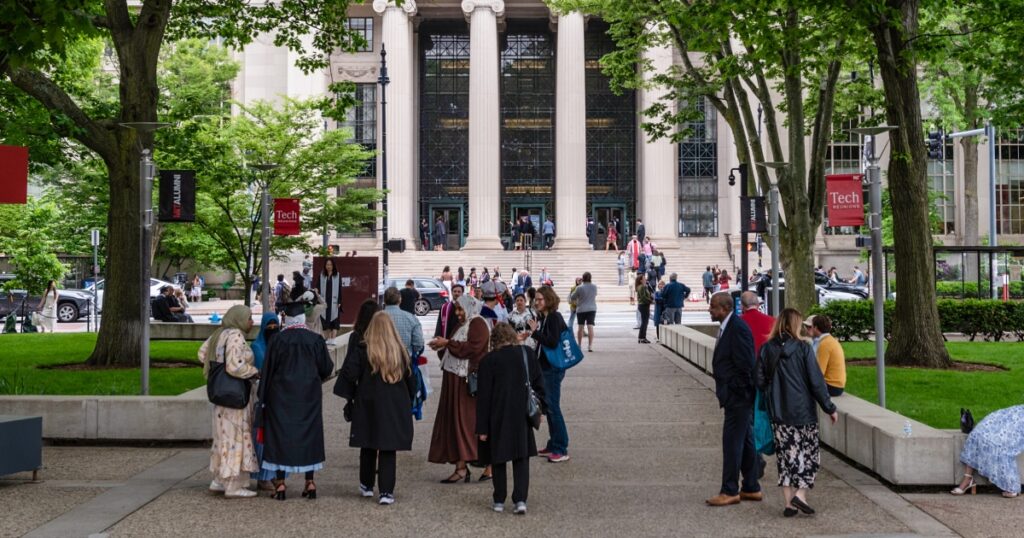MIT Student Disqualified from 2025 Graduation Over Political Speech Disruption
The Massachusetts Institute of Technology (MIT) has taken the unprecedented step of barring its 2025 graduating class president from participating in the upcoming commencement ceremony, following her controversial speech at a recent university event. The decision was announced after she delivered a politically charged address that challenged institutional ties and sparked widespread debate.
Controversial Speech Sparks Institutional Response
According to an official statement issued by MIT on Friday, the student-whose identity has been publicly linked to Megha Vemuri-delivered a speech at the university’s OneMIT graduation event that deviated from the scheduled program. The university clarified that although she was initially slated to have a role in the ceremony, she was subsequently informed she would not be permitted to participate.
Kimberly Allen, MIT’s spokesperson, emphasized the institution’s stance on free expression while defending the decision: “While MIT upholds the right to free speech, this action was taken because the individual intentionally misled the event organizers and led a protest from the stage, disrupting a significant university ceremony.” The incident involved the student leading a demonstration that interrupted the formal proceedings, which MIT deemed unacceptable.
The Speech and Its Political Context
Vemuri’s address, which was shared online by the Palestinian Youth Circle, included a call for action against Israel’s military operations in Gaza. During her speech, she donned a Keffiyeh-a traditional Palestinian scarf-and accused MIT of maintaining connections with the Israeli military, alleging complicity in what she described as an assault on Palestinian civilians.
The ongoing conflict in Gaza has resulted in over 52,000 fatalities since October 7, 2023, when Hamas militants launched attacks that killed approximately 1,200 Israelis and took over 250 hostages. The international community, including the United Nations, has criticized Israel’s military response, particularly its blockade of Gaza and restrictions on humanitarian aid.
Vemuri’s speech called for MIT alumni and students to sever ties with Israel, framing the conflict as a genocide and urging the university to reconsider its affiliations. Her words resonated with many students, who responded with applause and cheers, some waving Palestinian flags in solidarity.
A Call for Academic and Moral Standpoints
In her address, Vemuri highlighted that the undergraduate student body had previously voted in favor of ending institutional ties with Israel. She also spoke out against what she described as threats and intimidation from university officials, asserting that her activism was met with suppression.
Despite these challenges, she expressed confidence in her community’s moral stance: “The MIT community I know would never tolerate genocide,” she declared. She then urged her classmates to participate in a symbolic tradition-turning their class rings, which feature MIT’s mascot, Tim the Beaver. She explained that removing the rings and turning them so the beaver faces outward symbolizes the responsibility students carry as they step into the world, bearing the weight of their institution’s reputation and their moral commitments.
Institutional Silence and Broader Implications
While MIT President Sally Kornbluth delivered a commencement speech on Thursday, encouraging graduates to become ambassadors of scientific inquiry and open debate, she did not address the incident involving Vemuri directly. It remains unclear whether the student will officially graduate, as the university has not issued a formal statement confirming her graduation status.
This incident is not isolated; earlier this month, New York University (NYU) withheld the diploma of student Logan Rozos after he delivered an unauthorized speech addressing the “atrocities currently occurring in Palestine” amid the Israel-Hamas conflict. NYU condemned Rozos’ speech as an expression of personal political views, highlighting the ongoing tension surrounding free speech and political activism on college campuses.
The Broader Landscape of Political Expression in Academia
The MIT case underscores the complex balance universities seek between fostering open dialogue and maintaining order during formal events. As political debates intensify, institutions are increasingly scrutinized for their responses to student activism. The decision to exclude Vemuri from graduation reflects a broader trend of universities grappling with how to handle disruptive political speech while respecting free expression rights.
Expert Perspectives and Future Outlook
Educational experts note that such incidents highlight the importance of clear policies regarding speech and conduct during official ceremonies. While universities aim to promote academic freedom, they also have a duty to preserve the integrity of their events. The MIT case may serve as a precedent, prompting other institutions to reevaluate their protocols for handling politically sensitive situations.
As the debate continues, many advocate for a nuanced approach that allows students to express their views without undermining the solemnity of graduation ceremonies. The outcome of Vemuri’s situation could influence how universities navigate free speech and activism in the future, especially amid ongoing global conflicts that deeply divide communities.
Conclusion
The controversy surrounding MIT’s decision to bar its student leader from graduation illustrates the ongoing tensions between free expression and institutional order. As universities strive to uphold academic values, they must also consider the implications of political activism within their official events. The evolving landscape of campus speech will likely remain a focal point in discussions about academic freedom, student rights, and institutional responsibilities in the years to come.

